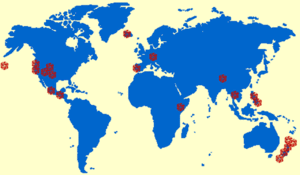CNBC today broadcast a long story aimed at getting U.S. government aid for Ormat Technologies, a geothermal company.
The CNBC reporter interviewed Ormat CEO and founder Dita Bronicki, and profiled the company’s operations in Reno, Nevada. At no time did the reporter mention a rather obvious fact, that Ormat is an Israeli, not an American company.
Instead he went on about an MIT study showing that geothermal is clean, that it could provide a substantial portion of America’s energy needs, and how fair it would be to give them help, since the government also helped deep water drillers and others in the past.
The MIT study (PDF) referred to this as "heat mining" but there are other
ways to use existing heat to generate electricity.
Ormat, for instance,
already has a $29 million deal with Canadian utilities to
produce electricity from residual industrial heat. Throughout the U.S.
this heat is generally wasted, as anyone who has driven past a Gulf
Coast chemical plant can attest. "Excess" gas is flared off when it
could be used to heat water and drive turbines. Ormat also has a business in small-scale power units that work unattended.
So, does Ormat deserve U.S. government help?
It does, the same help every other renewable producer of electricity deserves. That is, a floor price for their product,
a guarantee that if they can keep costs below a certain level they can
sell their product at a profit. It’s the same policy used in the past
to support farmers, where it has led to overproduction. High floor prices for sugar, in fact, help keep U.S. ethanol expensive, and caused Hershey’s to move its candy production to Mexico, where sugar is cheaper.
Beyond that, however, no subsidy is necessary. Research is certainly
welcome, but beyond the siting of resources it’s foolish to subsidize
what should be a valid business, with a working business model. What Ormat and other producers need is investment, and incentives that tilt investment toward
sources like geothermal that can, in time, produce hydrogen without
hydrocarbons.
The time for getting this part of The War Against Oil started is now.












